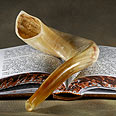
'Do holy items really have to be purchased abroad?' Shofar
Photo: Shutterstock
The Defense Ministry has no problem purchasing foreign goods: The socks, uniform and even symbols worn by the IDF
soldiers are all made abroad.
Ahead of the Jewish New Year
and Yom Kippur,
the Defense Ministry issued a tender for the purchase of 150 ram's horns. This year, for the first time, a number of foreign manufacturers competed against the Israeli market.
Now it turns out that even the shofar (ram's horn) blown on the High Holidays is being imported from China and Morocco – all in order to save NIS 4,500 (about $1,215).
Warning
Yoav Zeitun
Tel Aviv's Religious Council discover ram's horns made in northwestern African country glued with polyester, making them unfit as far as Jewish Law is concerned. 'It's disrespectful bringing a shofar made by an Arab on Shabbat into a synagogue,' says one of council workers
The local manufacturers later learned that their foreign competitors won the bid thanks to a small price difference – NIS 30 ($8) per shofar.
"I offered a shofar for NIS 70 ($19), which hardly leaves me a profit, and the winner made an offer of NIS 40 ($11)," said Avraham Rivak, who has been manufacturing ram's horns for the IDF for many years. "It's a pity that the Defense Ministry does something like this."
Shimon Keinan, a manufacturer from the Golan Heights, said the Defense Ministry didn't even inform him of the bid although he is defined as an official defense establishment supplier.
Favoring foreign products could negatively affect the industry, which is already in difficulties due to the import of ram's horns to the civilian market as well, he argued.
"Such a purchase could have serious affect on me," he said. "Why aren't they helping the local market? Do holy items really have to be purchased abroad? It's just foolish."
'I would have given it to IDF for free'
Zvika Bar-Sheshet, whose family began making shofarot in the 14th century in Spain, appeared to be particularly insulted.
"This conduct is idiotic and very irritating," he said. "We are not talking about the purchase of warplanes or tanks for millions of shekels. This was a bid of several thousand shekels, and the Defense Ministry would hardly have lost anything by favoring Israeli manufacturers.
"If the IDF had told me they didn't have money, I would have even given them the shofarot for free," he added.
The Chief Rabbinate expressed its support for the Israeli manufacturers, but for different reasons.
"In terms of items used for religious purposes, the production must remain in Israel," said Rabbi Aryeh Levin, head of the ritual objects department at the Tel Aviv Religious Council. "Beyond the economic aspect, there is an aspect of holiness."
The Defense Ministry said in response that it supports Israeli products, but that in this case the price differences were extreme.
"The offer submitted by the Israeli supplier was double the offer submitted by the winning supplier," the ministry said in a statement. "The Ministry is committed to purchasing products made in Israel on the one hand, and to economic efficiency on the other hand."
- Follow Ynetnews on Facebook















